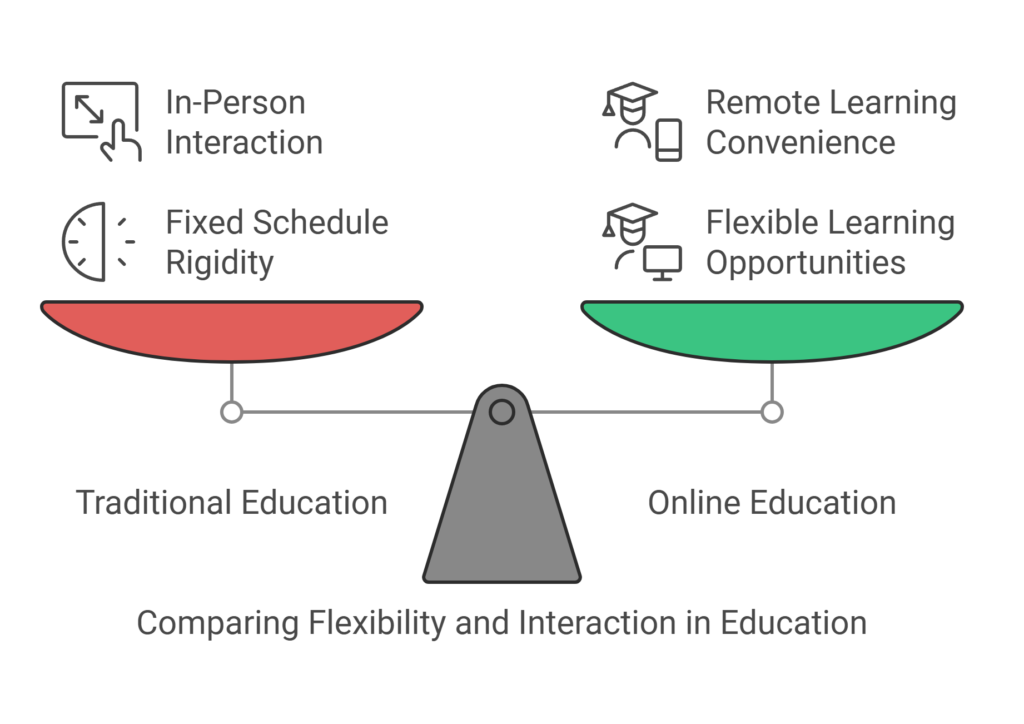Explore the Top Careers You Can Pursue with an Online MBA
Introduction
In today’s competitive job market, acquiring advanced qualifications like an MBA can significantly enhance career prospects. However, balancing a full-time job, personal responsibilities, and education is often challenging. Enter the online MBA, a flexible and accessible way to achieve career goals while maintaining your current commitments. This blog explores the top career paths you can pursue with an online MBA, including the skills required, industry demand, and expected salary ranges.
Why Choose an Online MBA?
The popularity of online MBAs has soared, particularly as technology bridges the gap between remote learning and professional development. According to GMAC, many professionals opt for online MBAs due to their adaptability and cost-effectiveness.
Key Benefits:
- Flexibility: Manage your studies alongside professional and personal commitments.
- Cost Savings: Lower tuition fees and no relocation costs.
- Networking: Access a global network of peers, mentors, and alumni.
- Career Advancement: Equip yourself with leadership and strategic skills.
Top Career Paths with an Online MBA
1. Management Consulting
Job Roles:
- Management Consultant
- Strategy Consultant
- Business Analyst
Why This Field?
Management consulting remains one of the most sought-after career paths for MBA graduates. Consultants solve complex business problems, optimize operations, and devise growth strategies.
Industry Demand:
Firms like McKinsey, Bain, and Deloitte actively seek MBA graduates for their analytical and strategic insights.
Salary Expectations:
Entry-level consultants earn between $85,000 and $120,000, with mid-career professionals surpassing $150,000 annually (Glassdoor).
Skills Needed:
- Strong problem-solving and analytical abilities
- Communication and interpersonal skills
- Strategic planning
2. Finance and Investment
Job Roles:
- Financial Analyst
- Investment Banker
- Portfolio Manager
Why This Field?
The finance sector values MBAs for their expertise in budgeting, forecasting, and risk management. Investment banking and private equity are particularly lucrative for those with strong quantitative skills.
Industry Demand:
From hedge funds to Fortune 500 companies, the demand for finance professionals with MBAs is consistently high.
Salary Expectations:
Starting salaries often exceed $80,000, with experienced professionals earning over $200,000, including bonuses (Payscale).
Skills Needed:
- Financial modeling and quantitative analysis
- Understanding of global markets
- Strategic decision-making
3. Marketing Management
Job Roles:
- Marketing Manager
- Brand Strategist
- Digital Marketing Director
Why This Field?
Marketing has evolved dramatically with digital transformation. Companies now require MBAs with a deep understanding of market trends, consumer behavior, and brand positioning.
Industry Demand:
Digital marketing roles, particularly in tech companies and e-commerce platforms, are in high demand.
Salary Expectations:
Marketing managers earn between $65,000 and $150,000, depending on experience and industry. Senior roles often come with performance bonuses (Indeed).
Skills Needed:
- Market research and data analysis
- Digital marketing expertise (SEO, SEM, analytics)
- Brand management
4. Operations and Supply Chain Management
Job Roles:
- Operations Manager
- Supply Chain Analyst
- Logistics Coordinator
Why This Field?
Global supply chain disruptions have heightened the demand for professionals who can optimize processes and ensure efficiency.
Industry Demand:
Industries such as manufacturing, e-commerce, and retail heavily rely on supply chain experts to reduce costs and enhance customer satisfaction.
Salary Expectations:
Entry-level salaries average around $70,000, with senior managers earning upwards of $130,000 annually.
Skills Needed:
- Process optimization
- Inventory management
- Data-driven decision-making
5. Entrepreneurship and Startups
Job Roles:
- Founder
- Business Development Manager
- Innovation Strategist
Why This Field?
An MBA provides a solid foundation for launching a business or scaling an existing startup. The curriculum covers essential areas like finance, marketing, and operations, which are critical for entrepreneurs.
Industry Demand:
Startups value MBA graduates for their ability to wear multiple hats and think strategically about growth.
Salary Expectations:
Entrepreneurs’ earnings vary widely but often surpass six figures once the business is established.
Skills Needed:
- Risk management
- Financial planning
- Team leadership
Challenges and Solutions
Challenges:
- Market Saturation: The rising number of MBA graduates can increase competition.
- Practical Skills Gap: Employers often look for hands-on experience in addition to theoretical knowledge.
- Balancing Responsibilities: Juggling work, personal life, and studies can be overwhelming.
Solutions:
- Choose the Right Program: Opt for an MBA with experiential learning components, like internships or live projects.
- Leverage Technology: Use tools like Trello and Notion to manage your schedule effectively.
- Continuous Learning: Stay updated with certifications in trending skills like data analytics and AI.
Future Prospects
The value of an MBA continues to evolve as industries adapt to emerging technologies and challenges.
Key Trends to Watch:
- AI Integration: The future of business is data-driven, and MBA programs increasingly incorporate AI and analytics into their curricula.
- Remote Leadership: The rise of remote work creates opportunities for MBAs to lead virtual teams effectively.
- Sustainability Focus: Businesses are prioritizing green practices, increasing demand for MBAs with expertise in sustainability.
FAQs
Q1: Are online MBAs as respected as traditional MBAs?
A1: Yes, particularly when earned from accredited institutions. Employers value the flexibility and self-discipline required for online learning.
Q2: Can I switch industries after completing an online MBA?
A2: Absolutely. Many professionals use MBAs to pivot careers, entering fields like consulting, tech, or finance.
Q3: How do I choose the right online MBA program?
A3: Focus on accreditation, faculty credentials, alumni networks, and curriculum flexibility. Resources like Find MBA can guide your search.
Conclusion
An online MBA offers a gateway to diverse and rewarding career opportunities. Whether you aspire to lead multinational corporations, launch your own startup, or specialize in finance, this degree equips you with the skills and networks to succeed.
Call to Action:
- Explore our MBA resources for more insights.
- Subscribe to our newsletter for career tips and updates.
- Download our free guide to choosing the best online MBA program.
Your career is your greatest asset. Take the first step toward unlocking its full potential with an online MBA today!












